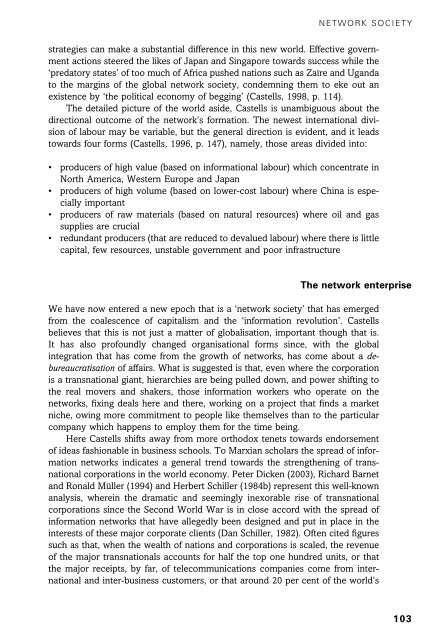Theories of the Information Society, Third Edition - Cryptome
Theories of the Information Society, Third Edition - Cryptome
Theories of the Information Society, Third Edition - Cryptome
Create successful ePaper yourself
Turn your PDF publications into a flip-book with our unique Google optimized e-Paper software.
NETWORK SOCIETY<br />
1<br />
1<br />
1<br />
strategies can make a substantial difference in this new world. Effective government<br />
actions steered <strong>the</strong> likes <strong>of</strong> Japan and Singapore towards success while <strong>the</strong><br />
‘predatory states’ <strong>of</strong> too much <strong>of</strong> Africa pushed nations such as Zaïre and Uganda<br />
to <strong>the</strong> margins <strong>of</strong> <strong>the</strong> global network society, condemning <strong>the</strong>m to eke out an<br />
existence by ‘<strong>the</strong> political economy <strong>of</strong> begging’ (Castells, 1998, p. 114).<br />
The detailed picture <strong>of</strong> <strong>the</strong> world aside, Castells is unambiguous about <strong>the</strong><br />
directional outcome <strong>of</strong> <strong>the</strong> network’s formation. The newest international division<br />
<strong>of</strong> labour may be variable, but <strong>the</strong> general direction is evident, and it leads<br />
towards four forms (Castells, 1996, p. 147), namely, those areas divided into:<br />
• producers <strong>of</strong> high value (based on informational labour) which concentrate in<br />
North America, Western Europe and Japan<br />
• producers <strong>of</strong> high volume (based on lower-cost labour) where China is especially<br />
important<br />
• producers <strong>of</strong> raw materials (based on natural resources) where oil and gas<br />
supplies are crucial<br />
• redundant producers (that are reduced to devalued labour) where <strong>the</strong>re is little<br />
capital, few resources, unstable government and poor infrastructure<br />
2<br />
1<br />
1<br />
The network enterprise<br />
We have now entered a new epoch that is a ‘network society’ that has emerged<br />
from <strong>the</strong> coalescence <strong>of</strong> capitalism and <strong>the</strong> ‘information revolution’. Castells<br />
believes that this is not just a matter <strong>of</strong> globalisation, important though that is.<br />
It has also pr<strong>of</strong>oundly changed organisational forms since, with <strong>the</strong> global<br />
integration that has come from <strong>the</strong> growth <strong>of</strong> networks, has come about a debureaucratisation<br />
<strong>of</strong> affairs. What is suggested is that, even where <strong>the</strong> corporation<br />
is a transnational giant, hierarchies are being pulled down, and power shifting to<br />
<strong>the</strong> real movers and shakers, those information workers who operate on <strong>the</strong><br />
networks, fixing deals here and <strong>the</strong>re, working on a project that finds a market<br />
niche, owing more commitment to people like <strong>the</strong>mselves than to <strong>the</strong> particular<br />
company which happens to employ <strong>the</strong>m for <strong>the</strong> time being.<br />
Here Castells shifts away from more orthodox tenets towards endorsement<br />
<strong>of</strong> ideas fashionable in business schools. To Marxian scholars <strong>the</strong> spread <strong>of</strong> information<br />
networks indicates a general trend towards <strong>the</strong> streng<strong>the</strong>ning <strong>of</strong> transnational<br />
corporations in <strong>the</strong> world economy. Peter Dicken (2003), Richard Barnet<br />
and Ronald Müller (1994) and Herbert Schiller (1984b) represent this well-known<br />
analysis, wherein <strong>the</strong> dramatic and seemingly inexorable rise <strong>of</strong> transnational<br />
corporations since <strong>the</strong> Second World War is in close accord with <strong>the</strong> spread <strong>of</strong><br />
information networks that have allegedly been designed and put in place in <strong>the</strong><br />
interests <strong>of</strong> <strong>the</strong>se major corporate clients (Dan Schiller, 1982). Often cited figures<br />
such as that, when <strong>the</strong> wealth <strong>of</strong> nations and corporations is scaled, <strong>the</strong> revenue<br />
<strong>of</strong> <strong>the</strong> major transnationals accounts for half <strong>the</strong> top one hundred units, or that<br />
<strong>the</strong> major receipts, by far, <strong>of</strong> telecommunications companies come from international<br />
and inter-business customers, or that around 20 per cent <strong>of</strong> <strong>the</strong> world’s<br />
103
















